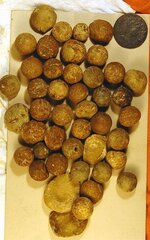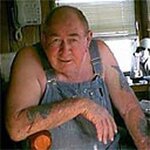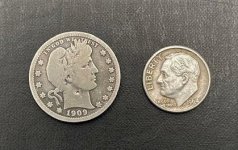tigerbeetle
Full Member
- Jan 2, 2009
- 166
- 275
- Detector(s) used
- Many -- Fisher, White's, Minelab, Cobra, others
- Primary Interest:
- Metal Detecting

You’ve likely heard of provenance. That’s the new (becoming overused) in-expression to indicate the story behind an object. On the always-cool “Antiques Road Show,” the value of provenance comes into play on close to half of all items highlighted. A military uniform is worth “X” dollars until the same uniform is featured on a photo of great-great granddaddy as he headed for Gettysburg. Quadruple the uniform’s value.
I bring that up to highlight far and away the most provenance laden items I have ever dug. I have no paperwork or fading photos to go along with them, per se.
I found the items on something of a whim.
My buddy Ed and I had driven to Manalapan, N.J., to visit the Battle of Monmouth state park. It was just a research mission, a chance to see where the longest battle of the War for Independence took place. We knew full well we could never detect there. The New Jersey state park system has some of the strictest “No Metal Detecting” laws in the country. Still, we had our detectors tucked in the cab of my truck.
The park and its “overlook” pavilion were historically interesting but Ed and I were beset by the urge to get out and find a place to do some detecting. But, surely, an area as historical as this wouldn’t afford even a square inch for TH’ers. And it didn’t. So we kinda made some room, so to speak.
I want to note this was many years ago and I am now an avowed respector of “No Trespassing” signs. That said, back then we left the state park and brazenly went into a nearby just-plowed farmer’s cornfield, knowing it was not that far from the Battle of Monmouth -- and could, in theory, hold a musket ball or two from that pitched and lengthy battle. We also knew that we would be rudely, if not crudely, ejected from the field the instant we were detected by “Farmer Brown” – the name we gave the unseen and unknown owner of the land.
“Any sign of Farmer Brown yet, Ed?”
“Nope, so far, so good.”
It wasn’t ten minutes into the hunt that musket ball after musket ball began to fly out of the furrowed ground. Within an hour, I had detected and dug enough lead material to create a weighed-down feel in my digging vest. The field seemed totally loaded with fired musket balls.
History aside: It would be tough to define the area we were hunting as a musket ball “cluster” or “concentration.” The field had been farmed every year since the battle. There was no chance that anything was “in situ.” Still, this showing of lead was more than just over-fire from the battle. This truly seemed to be the site of the battle. (Years later that was proven out through research).
As for the excitement factor of finding munitions from one of the deciding battles for independence, it was held in check by reality. We were so certain of immediate retaliatory strikes from Farmer Brown that the fun-factor was all but out the quivering window. Anyone who has pushed the envelope when it comes to inching onto private property knows exactly of what I speak. It’s hell trying to merrily detect while nervously glancing around like a roadside deer trying to graze.
And less than an hour into the hunt, it happened. We got busted. Not Farmer Brown but his late-teens son. Appropriately enough, he came rumbling across the field in an oversized John Deere tractor, issuing a cloud of dust that would have made a tornado proud.
Almost running me over, he ground to a halt, a dust cloud catching up and covering me. As the airborne soil settled, I looked up. The deep-tanned boy looming about six feet above me -- his John Deere growling like a pit bull just waiting for a “Sic ‘em!” Once he got a dust-free look at me, he yelled, “What the hell do you think you’re doin’!!” And, yes, such capture scenes are just as bad and embarrassing as one fears when opting to go covert.
I had actually rehearsed a slew of excuses for that moment but the ominous rumble of that big tractor forced me into the yell mode, squelching my plans to calmly and quietly explain that we were simply total tourists and apologize profusely for being such numbnuts.
Having to reduce my excuse offering to a few shout-able words, all I could get out was a truly lame, “We didn’t know.”
Mercifully, the kid turned off the tractor and dismounted, something like a gunslinger jumping off a huge black horse.
“You didn’t know you were on private property?” he asked, looking at me in the oddest of ways.
I lied best I could. “No, we’re up from down south.”
“Where down south?” he asked,” tilting his head and now looking at me beyond oddly.
(By the by, my good old buddy, who had been closer to the road where I had parked, utilized the tractor dust to beat a hasty retreat into a nearby tree line, then scurried back to my truck -- where he calmly assumed an I-been-here-all-along stance. What an irony, eh? One of the ugliest moments in the entire Revolutionary War was when General Charles Lee turned tail and ran at the height of the Battle of Monmouth, infuriating General Washington so thoroughly he galloped up and threatened to kill Lee if he didn’t turn around and re-engage the British. Ignoble retreat must just be in the air thereabouts.)
Anyway, all that staring from the farmer’s son made more sense when the kid asked, “Hey, are you from Long Beach Island?”
“Yep.” And I was.
“Hell, I life guarded on your beach in Ship Bottom last summer.” That was the LBI town where I lived.
“Oh, yeah. I remember. Good to see you.” Neither of those comments was totally true but I shook his hand, fully relieved that the situation was taking a sharp turn for the better. I even envisioned maybe getting out of this mess without the long detecting arm of the law swinging toward me.
I took the initiative: “Hey, truthfully my friend, sorry we came on your land. We’ll leave right now.”
Then those sweet words. “No, problem. You can hunt all you want.” He then added, If you see Bill (someone or other) back in Ship Bottom, tell him Sid (name change) said hello.”
“Will do.”
And in a flash he remounted his trusty diesel-sucking steed, fired her up and roared off, throwing a blind wave back over his bouncing shoulder.
So the sky was the detecting limit, then, right? I swear we didn’t find more than half a dozen more balls for maybe two hours of late-day hunting. I had nearly 50 in my pockets from the pre-bust dig.
As for the excitement of the day, what I lost in nervousness early on I gained in provenance after getting home and examining those balls, one at a time. I swear I could still feel the astounding intensity – face it, the near-terror -- that haunted that lead. To think that each one was held and loaded by a hand that had to be uncontrollably quaking – and sweating profusely. It was estimated that as many over-uniformed British died from dead stroke as enemy fire. I still occasionally look as them and realize they symbolize the start of this nation.
(Note: I will gladly loan a couple of these to any munitions expert who would like to further examine them. I can 1000 percent guarantee they were from the Battle of Monmouth. I believe they are mainly from “Bess” muskets. Contact me at [email protected].)
Amazon Forum Fav 👍
Upvote
0




